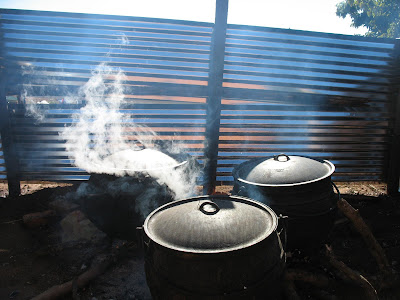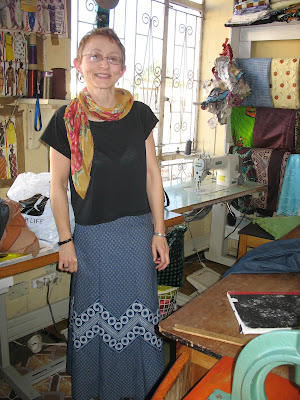Tuesday, May 12, 2020
Sunday, February 7, 2010
Virginia’s Lobola – It’s All About Food





Some time back -- I refuse to admit how long ago -- I began the story of my friend Virginia Dlamini Akintola's lobola (wedding dowry) event, which was held last June. Unfortunately, I only managed to post a description of some of the pre-day preparations before I got busy/lazy then the Internet connection on campus failed. So here's some more of the rest of the story. These sections will describe the food preparations, as Sharon, her friend Phindi and I were asked to help with the catering.
The next several groups of photos illustrate the intensive efforts made by many friends and family members to prepare for this event. Some of the cooking started the day before, but the bulk of the preparations were done on the actual day. We started early in the morning, and you can see from the hat and jacket I'm wearing that it was chilly at first. The kitchen warmed up, though, once the stove got going. I think we were finished cooking and ready to serve the meal by around 2:00 p.m.
We made food for approximately 300 people, about half of them invited guests and the rest locals who stopped by for a meal. In fact, Virginia had been forewarned by the community feeding center that it would advise the locals to visit her lobola for their daily meal. (Most poor areas have a community facility at which volunteers cook and serve donated food to the many orphans, un or under-employed, and otherwise disadvantaged people.) So we had to plan to feed as many folks as showed up.
We were given an empty outbuilding to use as a kitchen; it was outfitted with a propane range and a couple work tables. Other prep work (endless chopping for stews and salads) went on outside, as did additional cooking.
Virginia's Lobola -- food preparation, outside





The traditional way to cook large-crowd staples such as stews, rice, pap (cornmeal mush) and samp (cracked corn, which is usually mixed with sugar beans) at big events is in giant 3-legged cast-iron pots over a wood fire. Such cooking is not easy, as one must start and tend the fires, plus monitor and stir the pots. Then, once the food is cooked, one has to somehow wash those monstrously heavy pots, usually without the aid of hot running water. I wasn't involved with the outside pots at this event (Virginia requested that I prepare beef stroganoff inside the make-shift kitchen). However, I helped to cater a wedding at a later date, and ended up in charge of finding kindling for the fire and stirring the samp as I sunburned in the summer sun.
Other meat is grilled on the braai (barbecued); as in the U.S., that task seems the only cooking activity engaged in by men. Virginia and her husband Abiola purchased a whole cow for the lobola. There may also have been some chicken and I know there was goat stew(a tasty Nigerian delicacy). There was so much meat that many people ate their fill then carried home enough for the next day or two -- a sure sign of a successful event. Unfortunately, I don't think the eager crowd left much, if anything, for Virginia and her immediate family.
Virginia's Lobola -- food service, continued





As the various salads, vegetables, side dishes and stews were finished, they were transferred from the giant pots to bowls and metal pans, which were then carried into the main house to await the dinner service. The food was served two ways – a buffet line featuring all the different dishes was set up for the lobola’s official guests, while a more basic meal of pap or rice, vegetables and stew (maybe some braai as well) was served into styrofoam take-away containers for the long line of hungry locals who dropped by.
Saturday, November 21, 2009
New entries, at last
First of all, if anyone has been reading this, I apologize for the lack of entries this fall. One excuse I have is that I've been sick a lot; another reason for the lack of communication is that there’s not so much new to report. Life in the second year of a fellowship takes on a familiar and thus somewhat boring routine. For work, I’ve been teaching my classes – the News Reporting class again for JMC and one section of ACS (Academic Communication Skills – freshman English/composition), plus some practice sessions for Virginia’s grammar class. In my spare time, I’ve been trying to organize a couple workshops for the teacher training colleges, which is surprisingly and frustratingly difficult considering that we’re not charging the colleges a single emalangeni to come and teach their students useful methodologies. Unfortunately, while the lecturers (at least some of them) are enthusiastic about the opportunity, the college administrators seem to think these events will somehow involve effort on their parts, the prospect of which they adamantly oppose. This is definitely a place where people rise to their level of incompetence.
In my personal time, I watch TV, workout, take walks and talk to myself a lot (which I suppose begs the question of why I don’t take the time to write more blogs). Oh, and of course, I eat, which is why I must workout and take frequent walks. Living on campus is secure and convenient, but it also makes it easy to get into a rut of just going to work then coming home every day. Sometimes I go a week or so without visiting the outside world.
Anyway, as I haven’t a lot of new, exciting events to describe, I’ll go back and tell about some of the things that happened last spring.
In my personal time, I watch TV, workout, take walks and talk to myself a lot (which I suppose begs the question of why I don’t take the time to write more blogs). Oh, and of course, I eat, which is why I must workout and take frequent walks. Living on campus is secure and convenient, but it also makes it easy to get into a rut of just going to work then coming home every day. Sometimes I go a week or so without visiting the outside world.
Anyway, as I haven’t a lot of new, exciting events to describe, I’ll go back and tell about some of the things that happened last spring.
Virginia's Lobola -- part 1




Although Virginia and her husband Abiola have been married for about six years, they decided to hold the traditional lobola ceremony to cement the ties between their families. They chose the end of June, which meant I was able to attend before heading off on my summer break. About a week before the event, Virginia suggested that I acquire some more traditional attire for the occasion, so I went along with her to the tailor. Virgina was having a couple different garments made – she needed a traditional Swazi outfit to satisfy Swazi custom and a traditional Nigerian outfit to honor her husband’s family. I bought some of the blue and white fabric that’s pre-printed into panels from which to make a skirt. Traditional Swazi women wear skirts or dresses; in fact, wearing pants is considered improper, even slutty, and their are gangs of self-righteous traditional males who sometimes harass women (even foreigners) caught in slacks. Most rural women sport a uniform-like pinafore which often includes a built-in apron and ruffles around the sleeves and hem. I asked for a very simple, long skirt and was satisfied with the result.
In the week before the lobola, I also ran some errands with Virginia to fetch supplies to sustain the many guests who would be converging for the 2-day event and to deliver said items to the family homestead. We purchased fresh milk and mas (sour milk) from a local self-sustaining convent, acquired copious quantities of sweet potatoes, pineapples and paw paws from the farmer’s market, and arranged the purchase of an entire cow to ensure adequate supplies of meat (Swazis are insulted by small servings of meat).
The pictures included here include a couple at the tailor’s and from the convent where we bought the milk products (I loved the old wood stove there).
Subscribe to:
Comments (Atom)

